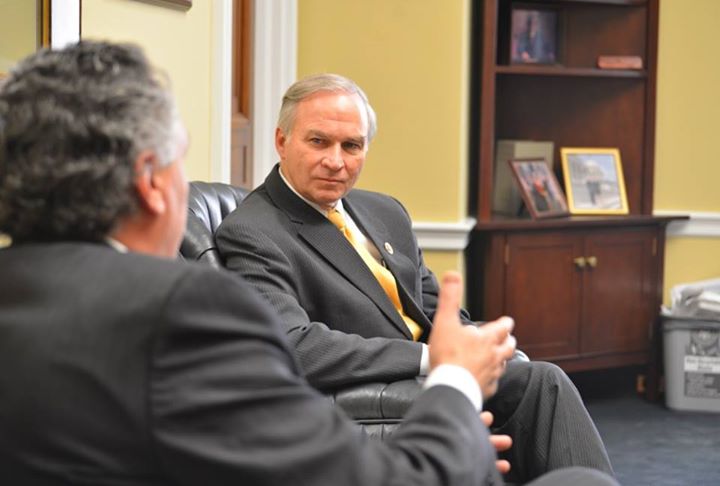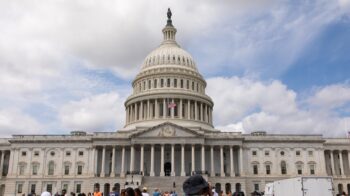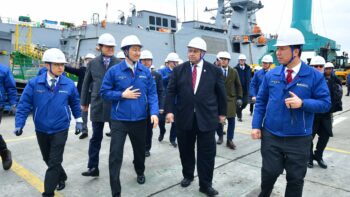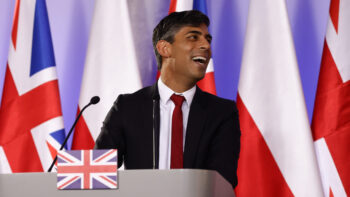
HASC Seapower chairman Randy Forbes (R-VA), one of the chief architects of the meeting.
Last week, almost unnoticed amidst the coverage of Typhoon Haiyan, House Armed Services Committee leaders met quietly with the ambassadors of six Pacific nations — including the Philippines — an unprecedented gathering of top diplomats on Capitol Hill.
HASC Seapower subcommittee chairman and occasional BreakingDefense contributor Randy Forbes (R-Va.) made clear in an interview that the timing was pure coincidence. “The timing couldn’t have been better,” Forbes told me, “[but] we’ve been working on this for months, not just this component but this whole series” of meetings.
“We” are Forbes and his Democratic partner Colleen Hanabusa, tapped by HASC chairman Buck McKeon and ranking Democrat Adam Smith to lead an “Asia-Pacific Oversight Series.” All four legislators were present last Tuesday to meet with the six ambassadors, a bold expansion of Congress’s role into direct contact with foreign governments, traditionally the preserve of the executive.
“It’s vitally important to send a message to our allies and our friends in this region that we’re serious about what we’re doing and we’re serious about this pivot” — the Obama administration’s much-debated “Pacific Pivot,” later redubbed a “rebalance” — “and that we’re resourcing it,” Forbes said. (With the sequester, shutdown, and general budgetary gridlock, of course, resources for anything are much in doubt). “What Congress is really trying to do is take the lead from what the administration has done. [They] wanted to make that shift, and now it’s time for Congress.”
Forbes & friends had in fact invited even more ambassadors — he mentioned Indonesia and Thailand in particular — but herding so many high-powered cats at once proved impractical. Those other nations, he hopes, will attend subsequent meetings. As it was, HASC had to be content with the ambassadors from the Philippines, Australia, Japan, New Zealand, and South Korea — all longtime treaty allies — and from Singapore, which while not a formal ally is an increasingly close partner, currently hosting the (technically troubled) first deployment of the Navy’s new Littoral Combat Ship, the USS Freedom.
Will the People’s Republic of China ever be invited? “Well,” said Forbes, “there’s no question that we’re going to be looking at China, and we’d love them to sit down at the table to discuss some of their military expenditures…so we can have some transparency on that.” (Such an outburst of candor from Beijing is utterly improbable, as Forbes well knows). But, he said, “the shift to the Asia-Pacific area really hasn’t involved the Chinese.”
So last week’s inaugural gathering was very much a mutual support session of close friends rather than a diplomatic breakthrough. “Each ambassador expressed their concern about the situation in the Philippines, [and] the ambassador of the Philippines spoke very graciously” about the aid his country has received, said Forbes. But on the wider issues of the Asia-Pacific, “each one of the ambassadors had kind of a different take. Some of them were talking about energy, some of them were talking about trade, some of them were talking about territorial disputes” — Forbes didn’t say who, but both Japan and the Philippines have had intense standoffs at sea with China — “so it was a pretty broad discussion.”
“Just having the meeting in itself serves a huge purpose,” Forbes said. “I think they were incredibly appreciative that they were at the table [sharing] what they view as their priorities in the region…. That had an impact in and of itself.”
Congress is notoriously parochial, and Americans in general are seen around the world as willfully ignorant of other nations’ needs. Last week, we took one small but significant step to change that.
Senate passes $95 billion foreign aid bill, as DoD eyes next Ukraine weapons package
Additional aid for Ukraine could be made available “within days” said Pentagon Press Secretary Maj. Gen. Pat Ryder earlier today.

























